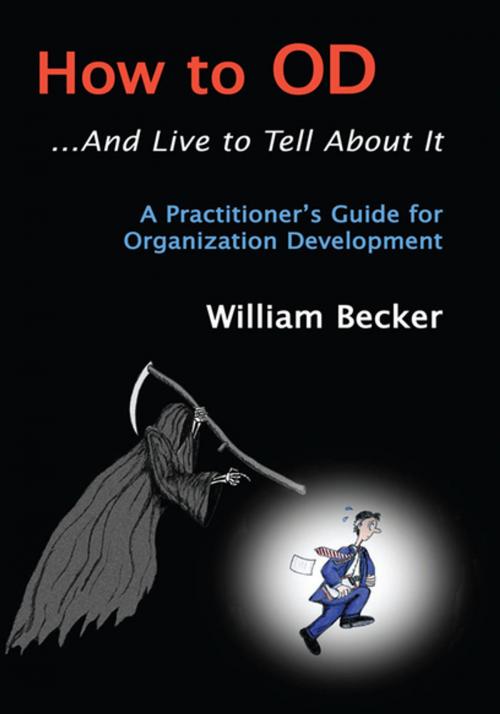How to Od... and Live to Tell About It
A Practitioner's Guide to Organization Development
Business & Finance, Economics, Development & Growth| Author: | William Becker | ISBN: | 9781462835386 |
| Publisher: | Xlibris US | Publication: | September 12, 2002 |
| Imprint: | Xlibris US | Language: | English |
| Author: | William Becker |
| ISBN: | 9781462835386 |
| Publisher: | Xlibris US |
| Publication: | September 12, 2002 |
| Imprint: | Xlibris US |
| Language: | English |
Organization Development, or OD as it is often referred to, is something of a sexy field that is part of the family of the Human Resource discipline, including training, coaching, mentoring, business strategy, change management, etc.
The Title
When being trained as an OD Practitioner at such institutes as National Training Laboratories (NTL) and some universities, one may hear the analogy that people fear change because it can mean the end of something with which we are familiar. Thus the concept of "death" (loss of job, status, position, group esteem, etc.) is part of the psychology noted in ones education in the field to help practitioners understand others angst over taking risks accompanying change. The title is, therefore, an obvious pun on "Overdose"/OD and living to tell about it relates to how to avoid unneeded risk for the practitioner and the client.
Benefits of the Book
The book is useful because it:
- Is a new and unique perspective on OD
- Is theoretically substantive and not academic
- Provides practical actions and tools
- Invites various approaches to OD
- Is humorous/wry for a serious subject
- Integrates theory with practice
- Balances client and consultant relationships
with business and organizational goals
- Demonstrates key points with short cases
- Gives the reader the whole loaf
Reviewers Comments
"Its not easy for someone with such a wealth of experience to distill it into a short tome. Bill has done his work and our profession a great service."(Nadine Pearce, Sr. Manager of OD, Nabisco)
"Bill Beckers new book provides a practical and intelligent guide for those who want to help organizations become better at doing what they are trying to do." (Nancy Brown, Consultant to Organizations)
"An excellent book! Its really good stuff! Bills approaches to various topics and ways of describing them are really useful. The books organization is also superb." (Donna Deeprose, Author, Speaker, Trainer)
"The book validates a lot of what I do and I definitely learned some things about organization/structure and conceptual/operational how tos"...It sparks my creative juices, and is a catalyst for new ahas relative to consulting models, theories, and concepts that OD practitioners may not have access to in one book." (Karen Massoni, OD Consultant and Professor of Organizational Dynamics at The New School)
"This book has something to add to the practice of OD, especially since it pulls so many theoretical strands together, socio-technical systems, chaos theory, expectancy-valence theory, large group change, specific future search processes, and situational leadership." (Victor Rhodd, OD and Employee Development Consultant, New York Power Authority)
"It reads like a combination diary and practitioners tool kit by weaving in and out of personal views and some really good case examples." (George Truel, Author and OD Practitioner)
"If you are going to read this book-and I strongly recommend you do....Beckers book is not a theoretical work. It is about the experience of OD, about the essential conditions that must be adhered to in order to do it profesionally, and about some of the mechanisms and guideposts that can be helpful in navigating through the huge complexity of a large-scale organizational change....it is worth reading. (Robin Stuart-Kotze,PhD., International Management Consultant and Professor)
Organization Development, or OD as it is often referred to, is something of a sexy field that is part of the family of the Human Resource discipline, including training, coaching, mentoring, business strategy, change management, etc.
The Title
When being trained as an OD Practitioner at such institutes as National Training Laboratories (NTL) and some universities, one may hear the analogy that people fear change because it can mean the end of something with which we are familiar. Thus the concept of "death" (loss of job, status, position, group esteem, etc.) is part of the psychology noted in ones education in the field to help practitioners understand others angst over taking risks accompanying change. The title is, therefore, an obvious pun on "Overdose"/OD and living to tell about it relates to how to avoid unneeded risk for the practitioner and the client.
Benefits of the Book
The book is useful because it:
- Is a new and unique perspective on OD
- Is theoretically substantive and not academic
- Provides practical actions and tools
- Invites various approaches to OD
- Is humorous/wry for a serious subject
- Integrates theory with practice
- Balances client and consultant relationships
with business and organizational goals
- Demonstrates key points with short cases
- Gives the reader the whole loaf
Reviewers Comments
"Its not easy for someone with such a wealth of experience to distill it into a short tome. Bill has done his work and our profession a great service."(Nadine Pearce, Sr. Manager of OD, Nabisco)
"Bill Beckers new book provides a practical and intelligent guide for those who want to help organizations become better at doing what they are trying to do." (Nancy Brown, Consultant to Organizations)
"An excellent book! Its really good stuff! Bills approaches to various topics and ways of describing them are really useful. The books organization is also superb." (Donna Deeprose, Author, Speaker, Trainer)
"The book validates a lot of what I do and I definitely learned some things about organization/structure and conceptual/operational how tos"...It sparks my creative juices, and is a catalyst for new ahas relative to consulting models, theories, and concepts that OD practitioners may not have access to in one book." (Karen Massoni, OD Consultant and Professor of Organizational Dynamics at The New School)
"This book has something to add to the practice of OD, especially since it pulls so many theoretical strands together, socio-technical systems, chaos theory, expectancy-valence theory, large group change, specific future search processes, and situational leadership." (Victor Rhodd, OD and Employee Development Consultant, New York Power Authority)
"It reads like a combination diary and practitioners tool kit by weaving in and out of personal views and some really good case examples." (George Truel, Author and OD Practitioner)
"If you are going to read this book-and I strongly recommend you do....Beckers book is not a theoretical work. It is about the experience of OD, about the essential conditions that must be adhered to in order to do it profesionally, and about some of the mechanisms and guideposts that can be helpful in navigating through the huge complexity of a large-scale organizational change....it is worth reading. (Robin Stuart-Kotze,PhD., International Management Consultant and Professor)















